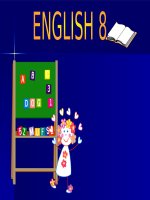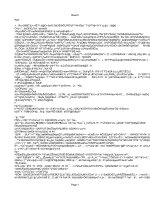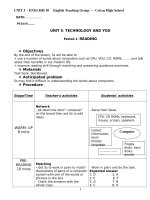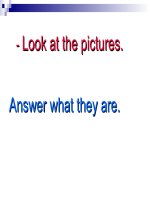- Trang chủ >>
- Y - Dược >>
- Gây mê hồi sức
PRACTICE UNIT 5 G11
Bạn đang xem bản rút gọn của tài liệu. Xem và tải ngay bản đầy đủ của tài liệu tại đây (84.56 KB, 9 trang )
<span class='text_page_counter'>(1)</span><div class='page_container' data-page=1>
<b>UNIT 5 : ILLITERACY</b>
I. Choose the word that has the underlined part pronounced differently from the
<b>others.</b>
1. a. please b. play c. black d. plenty
2. a. blouse b. blue c. blow d. pleasure
3. a. practice b. brown c. precious d. pride
4. a. pretty b. brother c. bread d. broad
5. a. medicine b. medium c. metro d. memory
6. a. steady b. ready c. feature d. measure
7. a. game b. general c. go d. gilf
8. a. envy b. sky c. happy d. tidy
9. a. stir b. tired c. strike d. mind
10. a. honest b. honour c. hour d. hospitable
<b> II. Choose the word which is stressed differently from the rest.</b>
1. a. illiterate b. education c. eradicate d. minority
2. a. province b. country c. campaign d. ethnic
3. a. primary b. promotion c. effective d. consider
4. a. struggle b. lesson c. village d. remote
5. a. farming b. technique c. receive d. number
<b>III. Choose the best answer.</b>
1. By 2000, sixty-one provinces and cities throughout Vietnam had completed the _______
programmes.
a. Universalisation of Primary Education b. Illiteracy Eradication
c. none of a and b d. Both a and b
2. What was the rate of illiteracy in Vietnam in 2000?
a. 94% b. 49% c. 6% d.
both a and b
3. In 2000, the Vietnam Society of Learning Promotion started a campaign for illiteracy
______ .
a. eradication b. universalisation c. education d. population
4. There were ______ more volunteer students taking part in providing reading and writing
skills to illiterate
people in 2001.
a. 600 b. 200 c. 800 d. 1,200
5. It is an honorable job to help illiterate people.
a. those who can’t haer and speak b. those who can’t sing and
dancd
c. those who can’t read and write d. those who are disabled
6. In 2002, the fight against illiteracy was expanded to the _______ areas.
a. countryside b. remote c. mountainous d. both a
and b
7. It is hoped that more and more people will take part in the struggle against illiteracy.
a. fight b. eradication c. volunteer d.
vacation
</div>
<span class='text_page_counter'>(2)</span><div class='page_container' data-page=2>
a. struggled b. expanded c. reached d. enlarged
9. There are 54 _______ minprities in Vietnam.
a. national b. primary c. ethnic d. main
10. _______ number of illiterate people are trying to learn how to read and write.
a. A b. The c. An d. none of a, b,
c.
11. ______ nimber of our class is fifty-two.
a. A b. An c. The d. none of a, b,
c.
12. When preparing ______ a report, I can never keep track of time.
a. of b. with c. on d. for
13. Before they left, they had promised to come back the next year.
a. “ We will come back next year” they said.
b. “ Let’s come back next year” they said.
c. “ We would come back the next year” they said.
D. “ We had better come back the next year” they said.
14. Have you completed your application form yet?
a. ejected b. promoted c. eradicated d. finished
15. _______ is the state of not knowing how to read and write.
a. Literacy b. Illiteracy c. Campaign d. Struggle
16. Every summer, hundreds of students participate in a campaign to eradicate illiteracy.
a. get rid of b. promote c. provide d. volunteer
17. The number of liiterate people in the remote and mountainousn areas is gradually
decreasing.
a. going up b. taking on c. becoming less d. coming up
18. Vietnamese people ______ for a long time to get independence and freedom.
a. promised b. struggled c. eradicated d. expanded
19. I prmise I will pay you back, in my ______ .
a. consideration b. honor c. hope d.
way
20. We have concerns about whether the government will be able to _______ a good education
for poor children.
a. spend b. combat c. volunteer d. provide
21. The conference continued after a ten-minutes break.
a. went on b. took part in c. came back d.
struggled against
22. Education is the best _______ for children’s future.
a. preparation b. eradication c. promotion d.
consideration
IV. Complete the second sentence so that it has a similar meaning to the first one,
<b>using the words given.</b>
1. “ Keep quiet,” the teacher said to us.
→ The teacher told us _______________________________________________________
.
2. “ We’ll come back again.”
→ They promised
__________________________________________________________ .
</div>
<span class='text_page_counter'>(3)</span><div class='page_container' data-page=3>
→ The lifeguard advised _____________________________________________________
.
4. “ Could you close the window?” John siad to Peter.
→ John asked
______________________________________________________________ .
5. “ You should join the football team, Eric,” said the teacher.
→ The teacher encouraged
____________________________________________________ .
6. “ I’ll give it to him tomorrow,” John said.
→ John promised
___________________________________________________________ .
7. “ Remember to lock the door before going to school,” my sister said.
→ My sister reminded _______________________________________________________
.
8. “ You should go home and rest for a while,” said the boss.
→ His boss advised _________________________________________________________
.
9. “ I’d like Lan to become a doctor,” my mum said.
→ My mum wanted _________________________________________________________
.
10. “ Don’t swim out too far,boys,” I said.
→ I warned
________________________________________________________________ .
11. She said : “ I’ll take you to town”
→ She offered
______________________________________________________________ .
12. “ Please, tell me how to make a pizza” He said.
→ He asked
________________________________________________________________ .
<b>V.</b> <b>Write the folowing sentences in reported speech, using the right form of the </b>
<b>words given in the brackets.</b>
1. “ Be careful of strangers and don’t go out at night.” ( WARN)
→ _______________________________________________________________________ .
2. “ You should not drink too much beer.” ( ADVISE)
→ _______________________________________________________________________ .
3. “ Come and see me whenever you want.” ( INVITE)
→ _______________________________________________________________________ .
4. “ Please don’t smoke in my car.” ( ASK)
→ _______________________________________________________________________ .
5. “ Sue, give me your phone number.” ( TELL)
→ _______________________________________________________________________ .
6. “ Don’t forget to give the book back to Joe.” ( REMIND)
→ _______________________________________________________________________ .
7. “ I’ll never do it again.” ( PROMISE)
→ _______________________________________________________________________ .
8. “ All right. I’ll wait for you.” ( AGREE)
→ _______________________________________________________________________ .
9. “ Please, lend me some money.” (ASK)
</div>
<span class='text_page_counter'>(4)</span><div class='page_container' data-page=4>
<b>VI.</b> <b>Choose the best answer.</b>
1. “ Don’t talk in class”, the teacher said.
a. The teacher told his student do not talk in class.
b. The teacher told his student did not talk in class.
c. The teacher told his student not to talk in class.
d. The teacher told his student not talking in class.
2. “ Susan, can you remember to buy me some sugar?” said Billy.
a. Billy advised Susan to buy him some sugar.
b. Billy reminded Susan to buy me some sugar.
c. Billy reminded Susan to buy him some sugar.
d. Billy invited Susan to buy me some sugar.
3. The secretary said, “ Sorry, I will never work on Sunday.”
a. The secretary promised not to work on Sunday.
b. The secretary refused to work on Sunday.
c. The secretary refused not to work on Sunday.
d. The secretary reminded her boss to work on Sunday.
4. “ Don’t stay up late. You should go to bed early.” Peter told me.
a. Peter told me not to stay up late and promised to go to bed early.
b. Peter promised not to stay up late and told me to go to bed early.
c. Peter told me do not to stay up late and advised me to go to bed early.
d. Peter told me not to stay up late and advised me to go to bed early.
5. “ _______,” John advised me.
a. You ought to work harder. b. I would rather work harder.
c. It is my duty to work harder. d. It is worth working harder.
6. “ _______,” the mother warned her sons.
a. Boys,don’t go near the lake. b. Boys,you will not go near the lake.
c. Boys, let’s go near the lake d. Boys, would you like to go near
the lake?
7. “ I will bring you some food.” He said to me.
a. He invited me to eat some food b. He offered to bring me some food.
c. He told me to bring some food. d. He advised me to bring some food.
8. The customer said, “ I would like to buy a coat”
a. The customerwanted to buy a coat. b. The customer said to buy a coat.
c. The customer told to buy a coat. d. The customer warned her to buy a
coat.
9. The police threatened, “ _______ .”
a. You should drive so fast b. Not drive so fast.
c. I had better you drive you to drive so fast d. Don’t drive so fast.
10. John ______ him my phone number.
a. invited me to give b. suggested me giving
c. said to me d. told me to give.
11. “ I would like a a cup of coffee, please,” Mr. Pike said to the wiater.
a. Mr. Pike ordered the waiter to bring him a cup of coffee.
b. Mr. Pike advised the waiter to drink a cup of coffee.
c. Mr. Pike warned the waiter not to drink a cup of coffee.
d. Mr. Pike invited the waiter to drink a cup of coffee.
12. “ Go on Susan! Aply for the job,” said the father.
</div>
<span class='text_page_counter'>(5)</span><div class='page_container' data-page=5>
c. The father encouraged Susan to apply for the job.
d. The father wanted Susan not to apply for the job.
13. The boss _______ bacause he was too lazy.
a. threatened to dismiss him b. threatened him to dismiss
c. suggested him to dismiss d. promised him to dismiss
14. “ _________ ?” John’s teacher advised him.
a. Why don’t you try again b. Why do you try again
c. Why did you try again d. Why must you try again
15. “ You _____ take more exercise,” my doctor advised me.
a. would like to b. ought to c. mustn’t d.
would
16. “ Go ahead. Jump again,” the instructor _______ .
a. urged b. promised c. demanded d.
required
17. “ _______” Peter offered.
a. I would like to sing a song b. I had better sing a song
c. I must sing a song d. Sing a song, please
18. “ Mary,please come to dinner tonight,” Henry said.
a. Henry invited Mary to come to dinner tonight. b. Henry invited Mary to come to
dinner that night
c. Henry warned Mary to come to dinner tonight. d. Henry told Mary please to come to
dinner that night.
19. “ I will take you to the airport in my car, Peter,” said Lee.
a. Peter offered to take Lee to the airport. b. Lee offered to take Peter to the
airport.
c. Peter advised Lee to go to the airport by car. d. Lee asked Peter to take him
to the airport by car.
20. “ I would like to be thinner,” Mary said.
a. Mary did not want to be thinner. b. Mary told to be thinner.
c. Mary wanted to be thinner d. Mary suggested to be thinner.
<b>VII. Identify the one underlined word or phrase that must be changed for the </b>
<b>sentence to be correct.</b>
1. Illiterate in developing countries is still growing at an alarming rate and that fact has not
changed much.
a b
c d
2. Illiteracy continues to be a critical problem, which demanding enomous resources from
local and state budgets.
a b c
d
3. The International Reading Association estimates that more than as one thousand research
papers
a b
are prepared each year on the subject of literacy.
c d
4. Peter advised me reading some more books.
a b c d
5. Special education is intended help both handicapped and gifted children to reach their
learning potentials
a b c d
</div>
<span class='text_page_counter'>(6)</span><div class='page_container' data-page=6>
a b c d
7. Mary found a dress in a corner that fitted her perfect.
a b c d
8. She speaks English well enough for being an interpreter.
a b c d
9. I enjoy not have to get up early when I am on holiday.
a b c d
10. The avarage U.S household has at least one TV set turned on for about seven hours a
day and
a b
</div>
<span class='text_page_counter'>(7)</span><div class='page_container' data-page=7>
<b>UNIT 5: </b> <b>ILLITERACY</b>
<b>PHẦN I: READING</b>
<b>Đọc đoạn văn sau rồi trả lời các câu hỏi sau bài đọc.</b>
Doctors Without Borders / Médecins Sans Frontières (MSF) is an independent international medical
humanitarian organization that delivers emergency aid to people affected by armed conflict, epidemics,
natural or man-made disaters, or exclusion from health are in more than 70 countries.
Each year, MSF doctors, nurses, logisticians, water-and-sanitation experts, administration, and other medical
and non-medical professionals depart on more than 3,800 field assignments. They work alongside more than
22,500 locally hired staff to provide medical care.
In emergencies and their aftermath, MSF provides health care, rehabilitates and runs hospitals and clinics,
performs surgery, battles, epidemics, carries out vaccination campaigns, operates feeding centres for
malnourished children, and offers mental health care. When needed, MSF also constructs wells and
dispenses clean drinking water, and provides shelter materials like blankets and plastic sheeting.
Through long-term programs, MSF treats patients with infectious diseases such as tuberculosis, sleeping
sickness, and HIV/ AIDS, and provides medical and psychological care to marginalized groups such as street
children.
MSF was founded in 1971 as a non-governmental organization to provide both emergency medical assistance
and bear witness publicity to the plight of the people it assists. As a private non-profit association, MSF is an
international network with sections in 19 countries.
1. What does MSF mean?
2. What is the aim of MSF?
3. Who involves in the MSF?
4. Tell some activites that MSF carries out when dealing with emergencies.
5. What is MSF's long-term program?
<b>Dựa vào nội dung đoạn văn trên, xác định các câu sau là ĐÚNG, SAI hay KHƠNG THỂ BIẾT</b>
<b>ĐƯỢC (Khơng xác định được). Nếu đúng, điền "T". Nếu sai, điền "F". Nếu không thể biết được,</b>
<b>điền "I" vào chỗ trống đầu mỗi câu.</b>
1. _______ MSF is often one of the first humanitarian organizations to arrive at the scene of emergency.
2. _______ MSF is a dependent international medical humanitarian organization.
3. _______ MSF was founded in 1971 as a non-governmental organization.
4. _______ MSF teams are composed of international volunteers and skilled local staff.
5. _______ MSF seldom carries out vaccination campaigns, or operates feeding centres for malnourished
children.
6. _______ For long-term goal, MSF only provides medical and spychological care to marginalized groups.
7. _______ MSF, a private non-profit association, is an international network with sections in many countries.
8. _______ MSF volunteers frequently work in the remote or dangerous parts of the world.
9. _______ MSF has proven expertise in the field of epidemiology.
10. _______ Founded in 1971, MSF provides emergency medical assistance and bears witness publicity to
the plight of people it assists.
<b>PHẦN II: VOCABULARY</b>
Dùng nh ng t đã cho đi n vào ch tr ng đ hoàn thành câu:ữ ừ ề ỗ ố ể
evaluate campaign community cooperation
gratitude illiterate satisfied minority
charitable promote fruitful facilitator
1. She sent them a present to express her ________.
2. Advertising companies are always having to think up new ways to ________ products.
3. It's only a tiny ________ of people who are causing the violence.
4. I am completely _______ with what I have written in my last test. The result must be very satisfactory.
5. It's impossible to ________ these results without knowing more about the research methods.
6. Someone who is functionally ________ can only read and write just a little.
7. The government have just begun their annual Christmas ________ to stop drunken driving.
</div>
<span class='text_page_counter'>(8)</span><div class='page_container' data-page=8>
10. I see my role as a ________ in my group. I have to enable other people to work in the way that can
bring the best result.
11. There's a large Jewish ________ living in this area.
12. This was the most _______ discussion. The both sides agreed to carry out the common policy.
<b>PHẦN III: GRAMMAR</b>
<b>Chọn một phương án thích hợp nhất điền vào chỗ trống để hoàn thành câu:</b>
<b>Câu 1:</b> Will you give Mary my message when she ______ to her office?
<b>A. </b>is returning<b>B. </b>will be returning <b>C. </b>will return <b>D. </b>returns
<b>Câu 2:</b> "What are you doing here so early?" - "I came ________ some extra work done."
<b>A. </b>so that to get <b>B. </b>so to get <b>C. </b>for to get <b>D. </b>to get
<b>Câu 3:</b> I hope you're having a good time and _______ your meal.
<b>A. </b>you enjoying <b>B. </b>enjoying <b>C. </b>to enjoy <b>D. </b>enjoy
<b>Câu 4:</b> This house is _________ the others we've seen.
<b>A. </b>far more expensive than <b>B. </b>further more expensive
<b>C. </b>farther more expensive than <b>D. </b>far most expensive
<b>Câu 5:</b> "You put on some weight, haven't you?" - "Yes, It's because I've stopped _______."
<b>A. </b>to dieting <b>B. </b>dieting <b>C. </b>diet <b>D. </b>to diet
<b>Câu 6:</b> I don't like _______ what to do.
<b>A. </b>is told <b>B. </b>was told <b>C. </b>being tell <b>D. </b>being told
<b>Câu 7:</b> "I called earlier, but no one answered the phoned." - "I know. I was out _______ care of my roses."
<b>A. </b>for taking <b>B. </b>taking <b>C. </b>to take <b>D. </b>to taking
<b>Câu 8:</b> Ann pretended _______ me as she passed me in the street.
<b>A. </b>not to see <b>B. </b>not see <b>C. </b>not seeing <b>D. </b>not to seen
<b>Câu 9:</b> Farmers look forward to _______ every summer.
<b>A. </b>participate in the country fairs. <b>B. </b>participating in the country fairs.
<b>C. </b>be participating in the country fairs <b>D. </b>have participated in the country fairs.
<b>Câu 10:</b> They do not permit _______ without a ticket.
<b>A. </b>entering <b>B. </b>to enter <b>C. </b>enter <b>D. </b>entered
<b>Câu 11:</b> ________ you go to Canada, you should visit Toronto.
<b>A. </b>As <b>B. </b>Since <b>C. </b>Unless <b>D. </b>When
<b>Câu 12:</b> It was very kind ________ me a ride to work today.
<b>A. </b>of you to give <b>B. </b>you have given <b>C. </b>you giving <b>D. </b>for you to give
<b>Câu 13:</b> _______ is extremely dangerous.
<b>A. </b>At very high speeds driving cars <b>B. </b>Driving cars at very high speeds
<b>C. </b>Cars at very high speeds driving <b>D. </b>Cars driving at very high speeds
<b>Câu 14:</b> I'm sure I locked the door. I clearly remember _______ it.
<b>A. </b>locking <b>B. </b>to be locked <b>C. </b>to lock <b>D. </b>to have locked
<b>Câu 15:</b> Mary was reading a book ________ waiting for a bus.
<b>A. </b>as though <b>B. </b>as soon as <b>C. </b>while <b>D. </b>so that
<b>Câu 16:</b> _______ able to find a taxi, we ended up walking to the airport.
<b>A. </b>Not being <b>B. </b>Being not <b>C. </b>We weren't<b>D. </b>We not
<b>Câu 17:</b> She suggested ______ for a swim.
<b>A. </b>goes <b>B. </b>going <b>C. </b>go <b>D. </b>to go
<b>Câu 18:</b> Her watch needs _______.
<b>A. </b>repairing <b>B. </b>to be repaired
<b>C. </b>both "repairing" and "to be repaired" <b>D. </b>repaired
<b>Câu 19:</b> Don't forget _______ the letter I gave you.
<b>A. </b>to post <b>B. </b>post<b>C. </b>posted <b>D. </b>posting
<b>Câu 20:</b> Because I grew up in a house, I find ________ in an apartment inconvenient.
<b>A. </b>having lived <b>B. </b>to live <b>C. </b>living <b>D. </b>to living
<b>Đọc đoạn văn sau rồi chọn một từ thích hợp nhất điền vào chỗ trống, từ câu 21 đến câu 35</b>
A YEAR WITH OVERSEAS VOLUNTEERS
</div>
<span class='text_page_counter'>(9)</span><div class='page_container' data-page=9>
The people were always very friendly and helpful, and I soon began to appreciate how 24______ the
countryside was.
One of my jobs was to supply the village with water. The well was long walk away, and the women used to
25______ a long time every day 26______ heavy pots backwards and forwards. So I contacted the
organization and arranged to 27______ some pipes delivered. We built a simple pipeline and pump, and it
worked first time. It wasn't perfect - there were a few 28______, but it made a great difference to the
villagers, 29______ had never had running water before. And not 30______ did we have running water, but
in the evenings it was hot, because the pipe had been 31______ in the sun all day.
All in all, I think my time with OV was a good experience. Although it was not well-paid, it was well
32______ doing, and I would recommend it to anyone who was 33______ working for charity.
Finally, there's one more reason why I'll never 34______ working for OV. A few months before I left, I met
and fell in love 35______ another volunteer, and we got married when we returned to England.
<b>Câu 21: </b> <b>A. </b>luxurious <b>B. </b>well-paid <b>C. </b>rich <b>D. </b>comfortable
<b>Câu 22: </b> <b>A. </b>planned <b>B. </b>expected <b>C. </b>felt <b>D. </b>found
<b>Câu 23: </b> <b>A. </b>live <b>B. </b>lives<b>C. </b>living <b>D. </b>lived
<b>Câu 24: </b> <b>A. </b>handsome <b>B. </b>sweet <b>C. </b>beautiful <b>D. </b>good-looking
<b>Câu 25: </b> <b>A. </b>spent <b>B. </b>spending <b>C. </b>spends <b>D. </b>spend
<b>Câu 26: </b> <b>A. </b>holding <b>B. </b>fetching <b>C. </b>wearing <b>D. </b>carrying
<b>Câu 27: </b> <b>A. </b>allow <b>B. </b>make <b>C. </b>let <b>D. </b>have
<b>Câu 28: </b> <b>A. </b>punctures <b>B. </b>leaks <b>C. </b>breaks <b>D. </b>splits
<b>Câu 29: </b> <b>A. </b>who<b>B. </b>that<b>C. </b>which <b>D. </b>they
<b>Câu 30: </b> <b>A. </b>only<b>B. </b>hardly <b>C. </b>also<b>D. </b>scarcely
<b>Câu 31: </b> <b>A. </b>lied <b>B. </b>laying <b>C. </b>lay <b>D. </b>lying
<b>Câu 32: </b> <b>A. </b>cost<b>B. </b>value <b>C. </b>worth <b>D. </b>price
<b>Câu 33: </b> <b>A. </b>considering<b>B. </b>thinking <b>C. </b>going <b>D. </b>planning
<b>Câu 34: </b> <b>A. </b>regret <b>B. </b>miss<b>C. </b>lose<b>D. </b>feel sorry
</div>
<!--links-->









